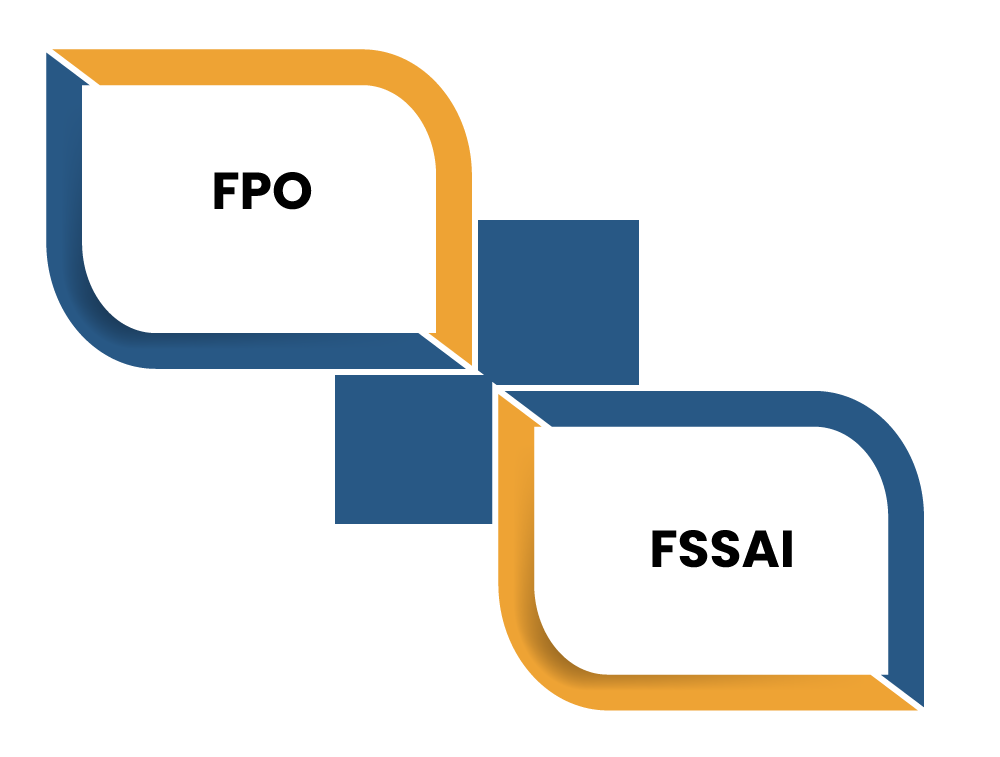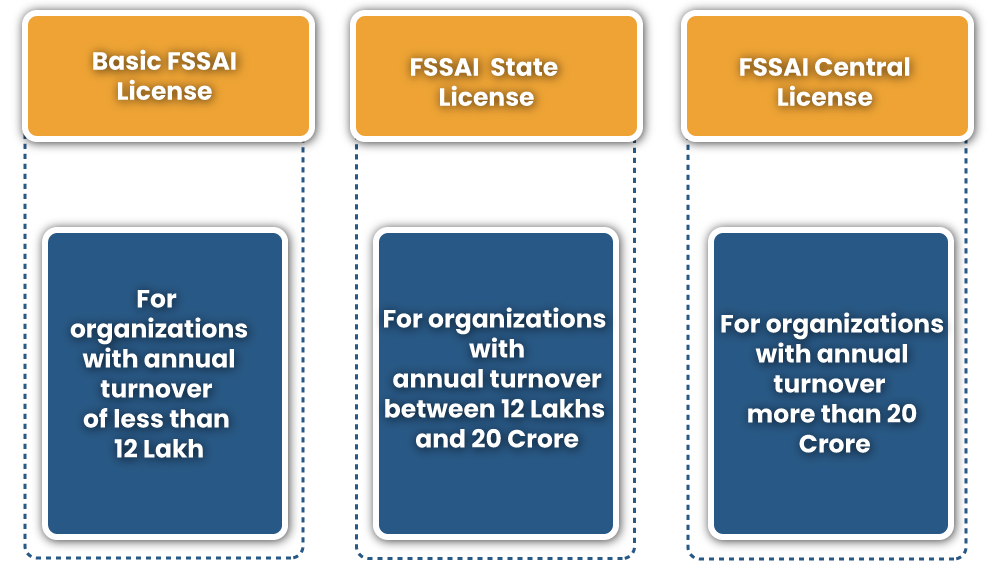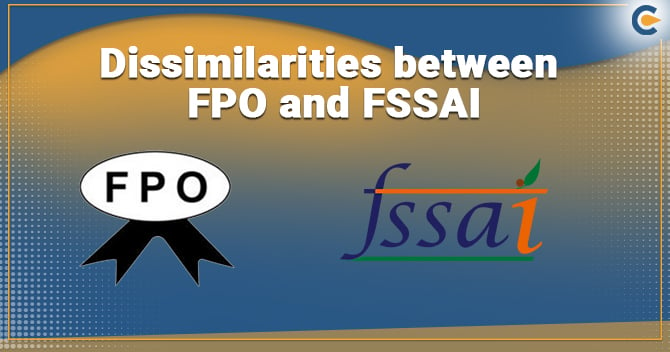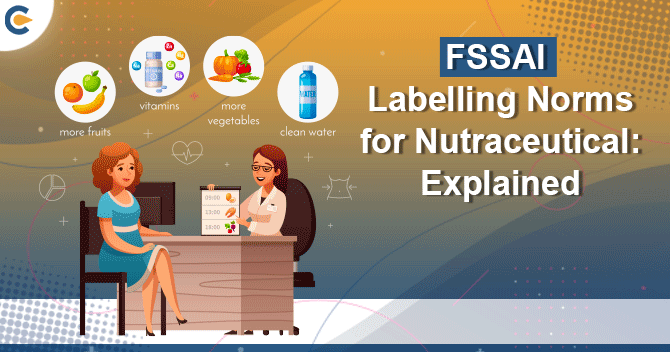India is the home to various cultures that has its own culinary and nutritive customs. This has directly influenced the Food Business in India which is an extensive mega-industry with never-ending players in the market. Let’s understand the dissimilarity between FPO and FSSAI and how did Indian Government thought of making strict regulations regarding food industry in India.
There are so many businesses in the Indian market related to food selling business that it becomes tough to standardize such a massive & nationwide food industry. And when it comes to such a significant market that specifically deals with customers and the safety and health of the public concern is always there. This is particularly true for the food industry. Any wrong product that is unsafe for human consumption can cause a huge damage to the society if launched in the marketplace. FPO and FSSAI both are related to the food business industry in India.
In order to maintain safety of the customers, the authorities have made stringent rules to regulate the food market in India in a very concise manner. The Government of India for a long time has numerous provisions and policies to regulate the food industry standards and safety measures to make food products consumable such as FPO and FSSAI.
Requirements for FPO and FSSAI
The requirements for FPO and FSSAI are that if any faulty product is consumed by a person can have consequences on your body and health in a very unfavorable, harmful and occasionally in a critical manner. Let’s take examples that you just consumed a product that caused mild food poisoning due to consumption of one of the ingredients present in the food products. This can be a secluded case when any one is affected but if the food poisoning takes place to every customer who purchased the particular food product. You can imagine the gravity and level of damage it can cause to the customers as well as society.
Possibly the best example of consuming food products without proper policy and safety standards can be the spread of Corona Virus that started from a ghetto market of Wuhan, China. Researchers have claimed that the virus spreaded through eating of various animals that are not usually safe for human consumption. Let’s see what steps India has taken to organize and control the Food Industry.
History of FPO and FSSAI
Before coming of FSSAI regulations[1], the government of India used to have several inscription, registrations and certificates that were used to regulate the food industry of India. FPO was one of the food regulations in India before implementation of FSSAI in the year 2006. FPO stands for the ‘Fruit Products Order’ which was formed as a health safety & hygiene regulatory certificate granted to food business operator that made food products made from fruits as well as vegetables. FPO and FSSAI registration was obligatory on producer of processed foods made using fruits and vegetables such as packaged juices, packaged vegetables, canned fruits, ready to eat food etc.
Fruit Products Order was active since 1955 and pretty much become a redundant order. In 2006 the new Food Safety and Standards Act of India came into effect and all previous registrations, certificates and licenses lost their lawful status. FSSAI became the only safety standard and rule for the complete food industry all over India.


FSSAI- Food Safety and Standards Regulation in India
In 2006 the Food Safety and Standards act of India came into effect. This is compulsory for all business that is organized as a food business operator for audit. Additionally, to examine and approve as a source of food that is safe and harmless for human consumption. This act authorized the amalgamation of all previous food organizations into one governing body that is known as FSSAI. Before coming of FSSAI, the regulation of food business was done as per the provisions of FPO.
FSSAI is the main regulator and principal body of the food industry in India. FSSAI operates as the existing governing authority and every new or old food business operator has to get itself registered and examined by FSSAI to be officially operational in India.
How does FSSAI work?
FSSAI has a decentralized organizational structure. Every state has a separate division of FSSAI office that works in coordination to the local municipal corporation of that particular state. It administers and controls the food industry by creating food quality principles. Moreover, safety regulations have become obligatory for every registered food business to follow. Food business operator who does not oblige and follow the guidelines from the FSSAI loses its permitted status and cannot function lawfully.
FSSAI Certification
The food industry is like any other business industry that requires shops, establishments and association of many different volumes. A local street restaurant can classified as a small business. While any admired fast-food chain can be categorized as a medium to large scale business. Alternatively, there are truly large scale business organizations such as FMCG goods producer as well as Hoteliers.
Business size is one of the important criteria in order to go for FSSAI Registration. The reason behind it is that any small scale business will not require as many regulations as a large scale business. Therefore FSSAI registration has three levels of registration in India.


Who wants FSSAI Registration in India?
The following persons and businesses are required to obtain the FSSAI registration-
- Wholesalers
- Transporter of food products
- Raw food products suppliers
- Online food business operators
- Food traders
- Food storage and production units
- Exporter and importer of food products
- Distributors of food products
- All types of food producer
Required Documents for FSSAI Registration
The documents required are bifurcated according to the different types of registrations, it has been explained below-
Basic Registration
- An identity proof along with photograph
- Passport size photograph
State & Central License
- Passport-sized photograph
- No Objection Certificate from the local municipality
- Memorandum of Association and Article of Association
- List of directors or partners
- Import Export registration
- Certificate of incorporation
- An identity proof that consists of a photograph
- Address Proof
Besides the above mentioned documents, the following documents are also necessary by the manufacturing unit:
- Report on water test
- List of all machinery
- List of all food categories
- Blueprint of warehouse
Consequences of Non-Compliance of FSSAI
Any registered person under the FSSAI regulations has to fulfill the rules and regulation under the Food and Safety Standards Act of India, 2006. Food safety official standardizes the examination of the food business and recognizes the stage of compliance with the law using a checklist that they already have.
Based on the compliance stage, the food safety official marks the compliance as the following:
- Compliance
- Non-compliance
- Partial compliance
- Not applicable
The food safety official can issue an improvement or expansion notice as per Section 32 of Food Safety and Standard Act. If the food business operator fails to fulfill with the notice, the official has the right to cancel his license. If any food business operator is insulted by the expansion notice then they can appeal to the State Commissioner of Food Safety of the particular state. The conclusion can be confronted by appealing to Food Safety Appellate Tribunal or high court of the specified State.
Conclusion
There are so many businesses in the Indian market related to food selling business that it becomes tough to standardize such a massive & nationwide food industry. And when it comes to such a significant market that specifically deals with customers and the safety and health of the public concern is always there. This is particularly true for the food industry. The Government of India for a long time has numerous provisions and policies to regulate the food industry standards and safety measures to make food products consumable such as FPO and FSSAI.
Read our article: Easily Register Your FSSAI License in Kolkata- Required Documents and Fees











